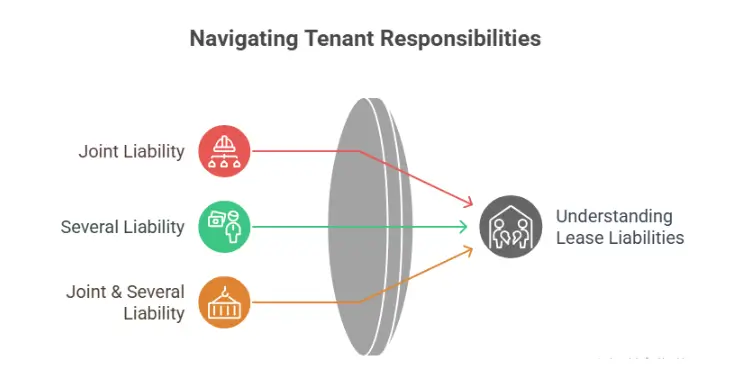A joint and several liability clause makes all roommates responsible for the rent. If one person doesn’t pay, the landlord can take the full amount from anyone.
Did you know 20% of small claims cases in the US involve roommates? A Florida renter said, “We were shocked when our deposit was gone.” I helped three roommates deal with a missed payment.
Quick hits
- Check your entire liability upfront.
- Track co-tenant defaults in writing.
- Request a single, unified deposit.
- Clarify group responsibilities before signing.
Meaning of joint several liability
I once saw a tenant group scramble when one person vanished before rent was due. The remaining tenants soon shouldered the extra debt, as their lease made each occupant responsible for the whole payment. This simple clause brought serious financial pressure.
Difference between joint liability obligations
When tenants share a “joint liability,” everyone is responsible for the full rent and upkeep. Any penalties are also shared if one person fails to pay. Each signature makes all roommates bound together in one commitment. Renters often overlook this until a shortfall arises and the landlord demands the rest of the balance.
Contrast with several independent liabilities
“Several liability” means each tenant is only responsible for their part of the total amount. Yet, friendships can fracture when a landlord uses a “joint and several” clause. This allows pursuit of any roommate for the entire debt. Insights from this resource show how important it is to confirm lease words before signing.
| Type | Responsibility | Key Impact |
|---|---|---|
| Joint Liability | Collective payment | All parties owe total rent |
| Several Liability | Separate shares | Each person covers a portion |
| Joint & Several | Shared and full obligation | Any tenant may cover the entire bill |
Trust your roommates and confirm if the lease includes “joint” or “several” language.

Advantages for landlords collecting rent
Landlords feel safe when many tenants sign a lease together. Each person must pay their share of rent. If one misses a payment, others can help out.
This makes sure the landlord doesn’t lose money. It helps solve problems fast.
Legally, anyone who signed the lease can be asked to pay if rent is late. This means the risk is shared among all tenants. Rent is paid faster because everyone knows they might have to pay more if someone else doesn’t.
Security deposit recovery when defaults
Landlords can use a single security deposit for repairs or damage, even if one tenant leaves. Leases often say the landlord can sue any tenant for extra cleaning costs.
- Check lease language for total deposit amount.
- Document unit condition with photos before move-in.
- Retain receipts for any damage you didn’t cause.
Confirm deposit coverage to avoid unexpected charges from a roommate’s unpaid damage.
Read More:
Implications for co tenants commitments
Co-tenants share more than just rent. If one person doesn’t pay, everyone is on the hook. I’ve seen friends struggle when one roommate leaves without paying.
Having clear roles from the start helps a lot. Make a list of who pays for what. Keep track of who does chores. A simple agreement can stop fights.
Roommate disputes over unpaid damages
Small accidents can lead to big bills. If damages aren’t paid, the whole group might get charged. Laws say everyone is responsible, even if they didn’t cause the problem.
Keep records of any accidents. Having a fund for repairs can help. I’ve seen friends avoid legal trouble by having a “repair kitty.”
Put a plan in writing among roommates on how to handle damage or unexpected bills before signing the lease.
Drafting clear enforceable liability language
I’ve helped many renters understand their lease agreements. “Severability” language is key. It keeps the contract strong even if one part fails.
“Waiver provisions” are also important. They stop people from saying they didn’t know about their duties. It’s important for everyone to know these rules.
Including Severability and Waiver Provisions
You can add a paragraph to explain what happens if part of the agreement fails. Landlords in the U.S. often use these clauses. They make sure everyone is responsible, even if one person messes up.
Clarifying Notice Requirements for Breaches
State laws say you must give written notice before losing your deposit or facing eviction. Say how many days you have to fix unpaid rent or damages. This helps avoid expensive legal battles.
Landlords and roommates like clear rules. It makes living together easier.
| Clause | Purpose | Sample Wording |
|---|---|---|
| Severability | Preserves remaining terms if one fails | “If any part is invalid, the rest remains enforceable.” |
| Waiver | Prevents attempts to dodge responsibilities | “No party may claim lack of notice as an excuse.” |
| Notice | Sets grace period for fixing breaches | “Tenant has 5 days to remedy nonpayment.” |
Insert a severability clause and confirm exact notice days for breaching tenants.
Handling disputes and settlement avenues
Stress hits when rent-sharing or damage splits go sour. I’ve seen roommates refuse to budge on repair bills or withholding payments. You can stay calm and consider settlement paths that save time and money.
Mediation often works best if both sides seek a midpoint. It’s a private discussion where a neutral person guides each party to a fair solution. Small fees may apply, yet it keeps courtroom tensions at bay.
When that route fails, small claims court handles sums tied to unpaid rent or repair costs. You might file documents with proof of your share, pictures of the damage, and any correspondence. Those needing clarity on upkeep obligations can visit maintenance responsibilities clause for insights on avoiding future disagreements.
- Gather dated photos of the damage
- Keep a paper trail of every email
- Bring receipts to show who paid for what
| Settlement Option | Approximate Fee Range |
|---|---|
| Mediation | $0 – $300 |
| Small Claims Court | $30 – $100 Filing Cost |
Try mediation first, then file suit if no payment comes.
Updating agreements after tenant turnover
I spent many late afternoons in Ogden workshops. Renters thought a simple name-crossing would fix the roommate shuffle. But, this method leaves gaps if liability is joint.
Landlords might see you on the hook for rent or damages. Tenants need clarity on who pays or repairs. This saves everyone grief under tenant & landlord law.
fresh lease clauses pinpoint the active parties. They revise each liability clause template. This update secures rights for new arrivals and locks in commitments left behind.
I urge beginner renters to confirm co-tenant name on a signed lease. Have it refiled if there’s a change when multiple residents swap out.
One missed signature can lead to disputes and avoidable fees. It’s safer to rewrite liability terms. This way, your landlord knows exactly who to contact for unpaid rent.
Keep each transition official to guard tenant rights down the road.
Get a fresh, signed updated lease each time a roommate leaves or arrives.












